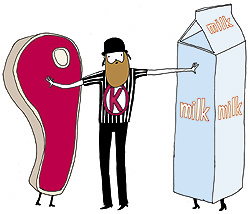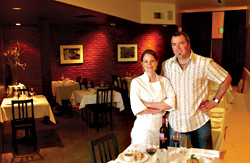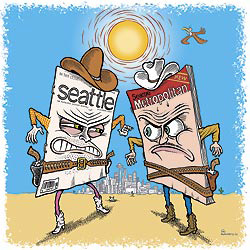Jewish dietary law has a Biblical basis, but it also serves modern eaters, Jewish or not. Kosher food preparation, for example, guards against insect infestation and the consumption of sick animals; the “downer” cows that ended up spreading BSE wouldn’t even have qualified for inspection.
In addition to its rich trove of Nordic culture, Seattle boasts a large per-capita population of Sephardic Jews (those of Spanish, Portuguese, or North African origin), who make up 10 percent of the roughly 40,000 Jews who live in Seattle. There’s also a vibrant orthodox community—located primarily in the Seward Park and Ravenna neighborhoods and on Mercer Island—supported by a kosher dining scene of unusual variety and quality.
Any city of significant size with restaurants proclaiming themselves kosher is likely also to have a supervisory organization that has certified them so. Here, that organization is the Va’ad HaRabanim of Greater Seattle, also known simply as the Va’ad. Consisting of five or six inspectors and a small office run by Rabbi Aharon Brun-Kestler, the Va’ad serves multiple functions: receiving and processing applications for kosher certification; inspecting certified eateries, often on a daily basis; and acting as a local authority to settle disputes and answer questions pertaining to kosher law.
Five restaurants currently hold the certification of the Va’ad (see sidebar), alongside certain Krispy Kreme locations, Leah’s Bakery in Ravenna (plus its catering facility in the U District), two grocery stores, several area bagel places, and the Nosh Away catering company in Renton. Recently sold by its Jewish former owner, the Panini Grill Cafe on Roosevelt Way is scheduled to drop its certification this Sunday; according to new owner Norberto Corona, there are two main reasons for this decision. Though the concentration of conservative and orthodox Jews on the North End suggests a substantial customer base, Corona claims he isn’t doing enough business as a kosher establishment.
Since taking over the place a few months ago, Corona has spruced up a menu dominated by simple pasta dishes, pizza, and panini sandwiches, and he wants to go further, adding shrimp and clams—nonkosher, like all shellfish. While the kosher incarnation of Panini Grill was valuable to the orthodox community, Corona’s decision comes down to two factors that might influence any restaurateur: finances and creative control. Still, some area Jews think Corona didn’t give the kosher format enough of a chance. A Ravenna resident whose family eats only at certified restaurants told me, “I feel like he’s not justified in giving up on the Jewish community, because there are always people in there. I think it’s a mistake for him to think he’s going to turn around his business if he becomes unkosher.”
A very different case is that of Pike Place Market’s Kosher Delight, a Jewish deli that serves no dairy in adherence to the kosher tenet that meat and milk may not interact. Kosher Delight offers the staples of Jewish cuisine (matzoh ball soup, chopped liver, etc.), is closed on the Jewish Sabbath (from Friday at sundown until Saturday at sundown), and serves only dairy-free cream cheese to avoid the dreaded milk-meat mix.
Yet the restaurant isn’t certified by the Va’ad. What does this mean, exactly? Brun-Kestler says it means you’re trusting the owner to employ kosher cleaning, cooking, and serving practices. “The whole thing of certification is basically an outside, third party stating that this is in fact what is happening,” he explains.
While I’ve spoken to orthodox Jews who dine at certified places but won’t go near Kosher Delight, the Pike Place establishment has a loyal clientele; it’s rarely empty at lunchtime, and its proprietor seems committed to keeping it kosher. Clearly, there’s a market for self-proclaimed kosher eateries outside the organization’s supervision, since knowing the owner’s personal standards is enough to give some Jewish diners peace of mind.
Despite the imminent loss of Panini Grill, the future of kosher Seattle looks bright. Mercer Island’s Stroum Jewish Community Center has plans to open Cafe Kinneret, a kosher falafel cafe, which will be under Va’ad supervision.
Thinking bigger, the rabbi recently studied the local economic profile of kosher products, finding that area consumers spend between $8 million and $12 million on distinctly kosher food and beverages such as kosher meet and cheese every year. (In addition, Certain products from locally beloved brands Thomas Kemper and Tim’s Cascade Potato Chips, like the restaurants and bakery listed in the sidebar, have passed muster with the Va’ad.) Along with the survival of kosher restaurants in not-so-Jewish neighborhoods, such numbers suggest that kosher has become a phenomenon larger than Judaism. “There’s certain spillovers of kosher into other communities,” Brun-Kestler says. “For example, many Muslims will buy kosher meat, certain people who think it’s purer will buy kosher meat.” Many non-Jews with dietary restrictions can benefit from the kosher certification system. “If you see the word ‘pareve,’ it means there are no dairy ingredients,” says the rabbi. “If you’re lactose intolerant, that’s a big thing.”
The key to success for kosher restaurants in Seattle is the same strategy that’s sustained many local vegetarian places: Make food so good that it attracts diners outside your target clientele. “In a place like Seattle, you really have to have a place that just happens to be kosher, not a kosher place,” Brun-Kestler explains. Yet perhaps Seattle was destined to become a kosher hub—and not only because lox and smoked salmon are just two different terms for the same basic food.
No, the factor that elevates Seattle above most midsize cities in terms of kosher power is, in fact, its preponderance of meat-free eateries. It makes for a lively symbiosis: Recent trends and ancient dictums collide, and you find yourself eating imitation pork at Teapot Vegetarian House among orthodox families, dairy-shunning anarchists, and curious first-timers just like you.
Seattle is arguably the best major city for kosher dining outside New York, L.A., and Chicago, and thanks to our superior assortment of certified eateries, Va’ad-supervised goodness is never far away. Below are some of the Emerald City’s top kosher establishments. (N.B. Panini Grill is scheduled to drop its certification on Sunday, Dec.19.)
Kosher Near You
Capitol Hill
Teapot Vegetarian House 125 15th Ave. E., 206-325-1010
Queen Anne
Bamboo Garden 364 Roy St., 206-282-6616
Ravenna
Leah’s Bakery 2205 N.E. 65th St., 206-985-2647 (Catering: 206-527-3360, ext. 217)
Redmond
Namasthe Indian Cuisine 16650 Redmond Way, 425-558-7858
Renton
Nosh Away 419 Rainier Ave. N., 206-772-5757/p>
Roosevelt
Panini Grill Cafe 6417 Roosevelt Way N.E., 206-522-2730








